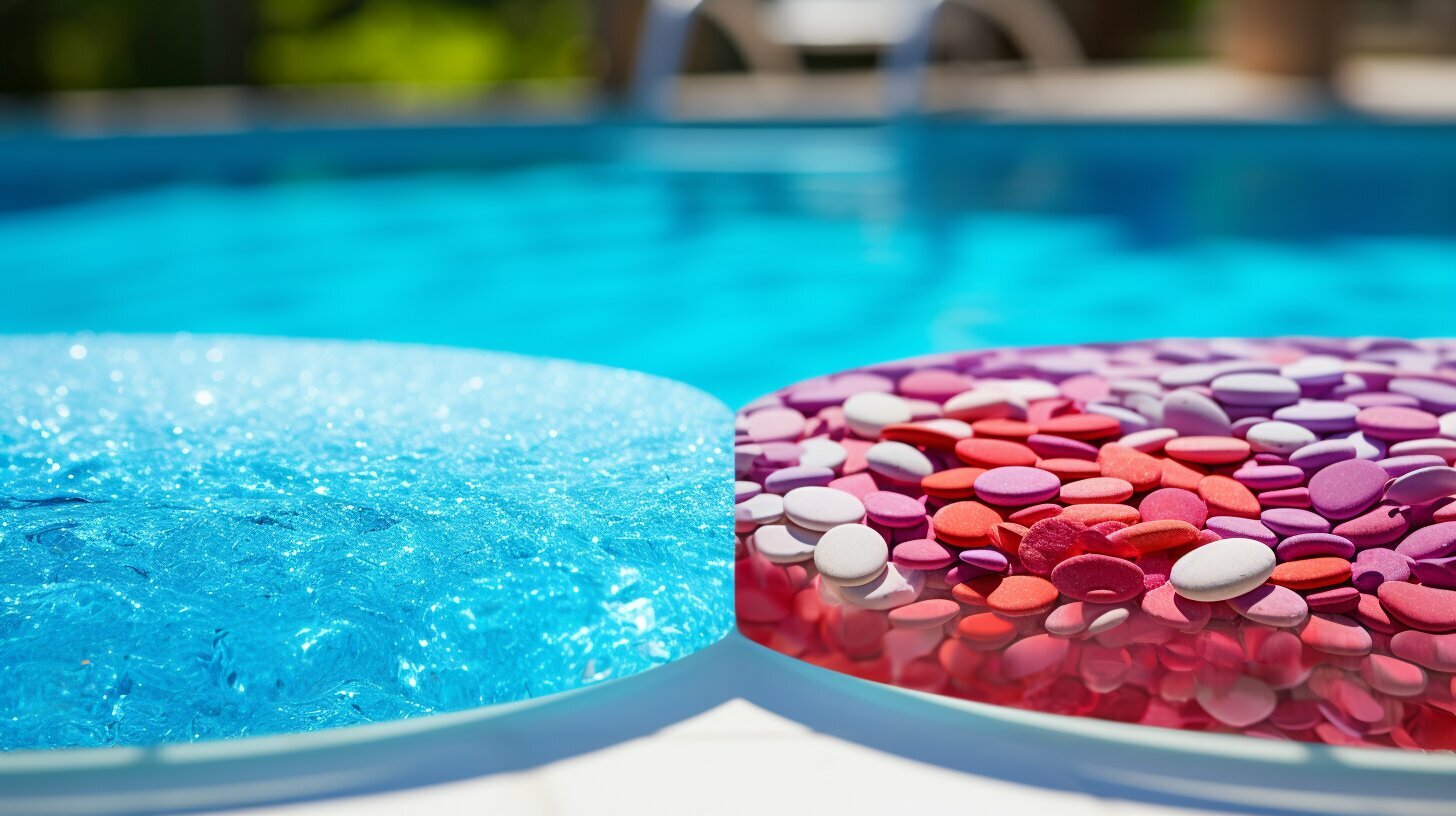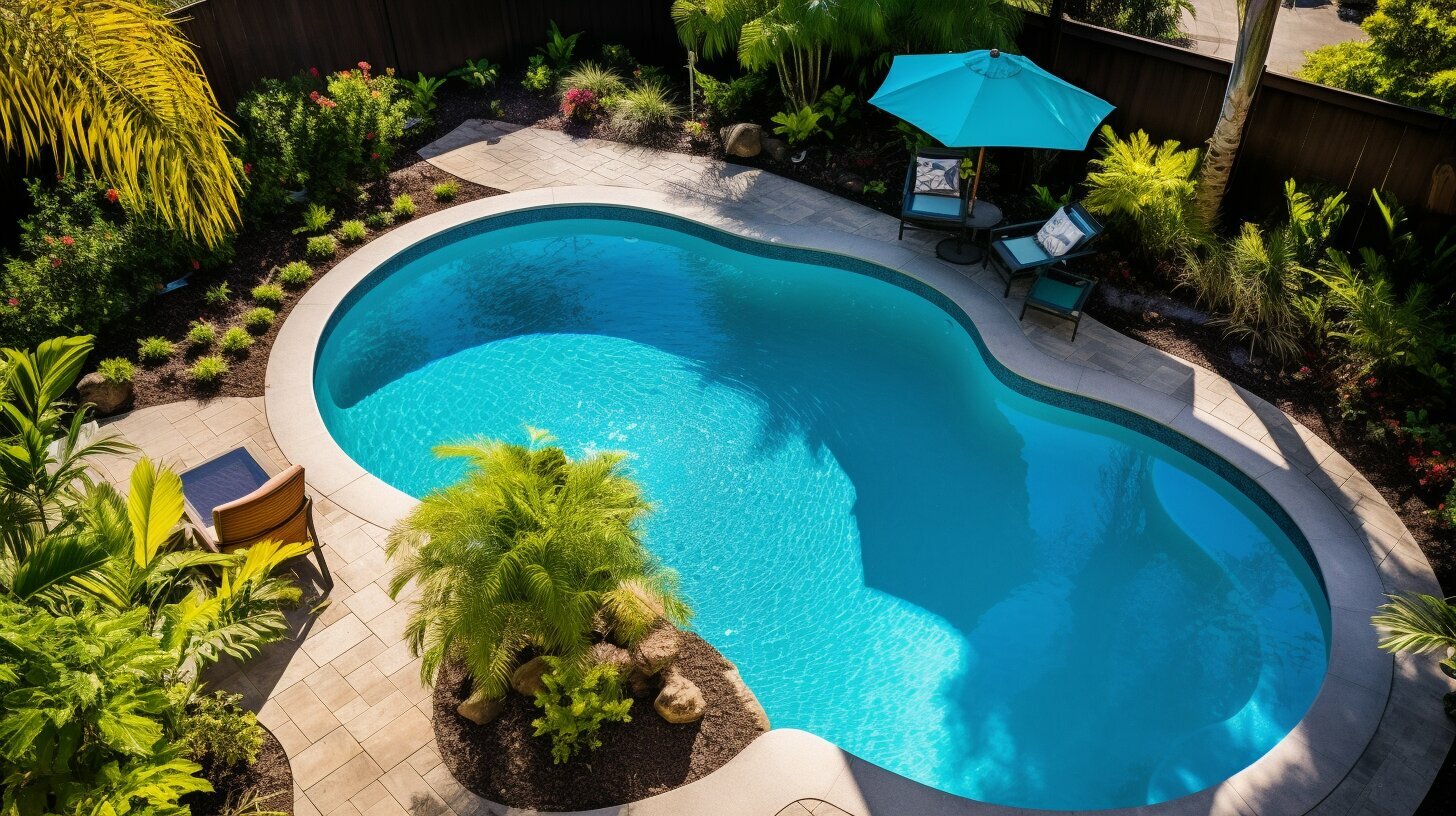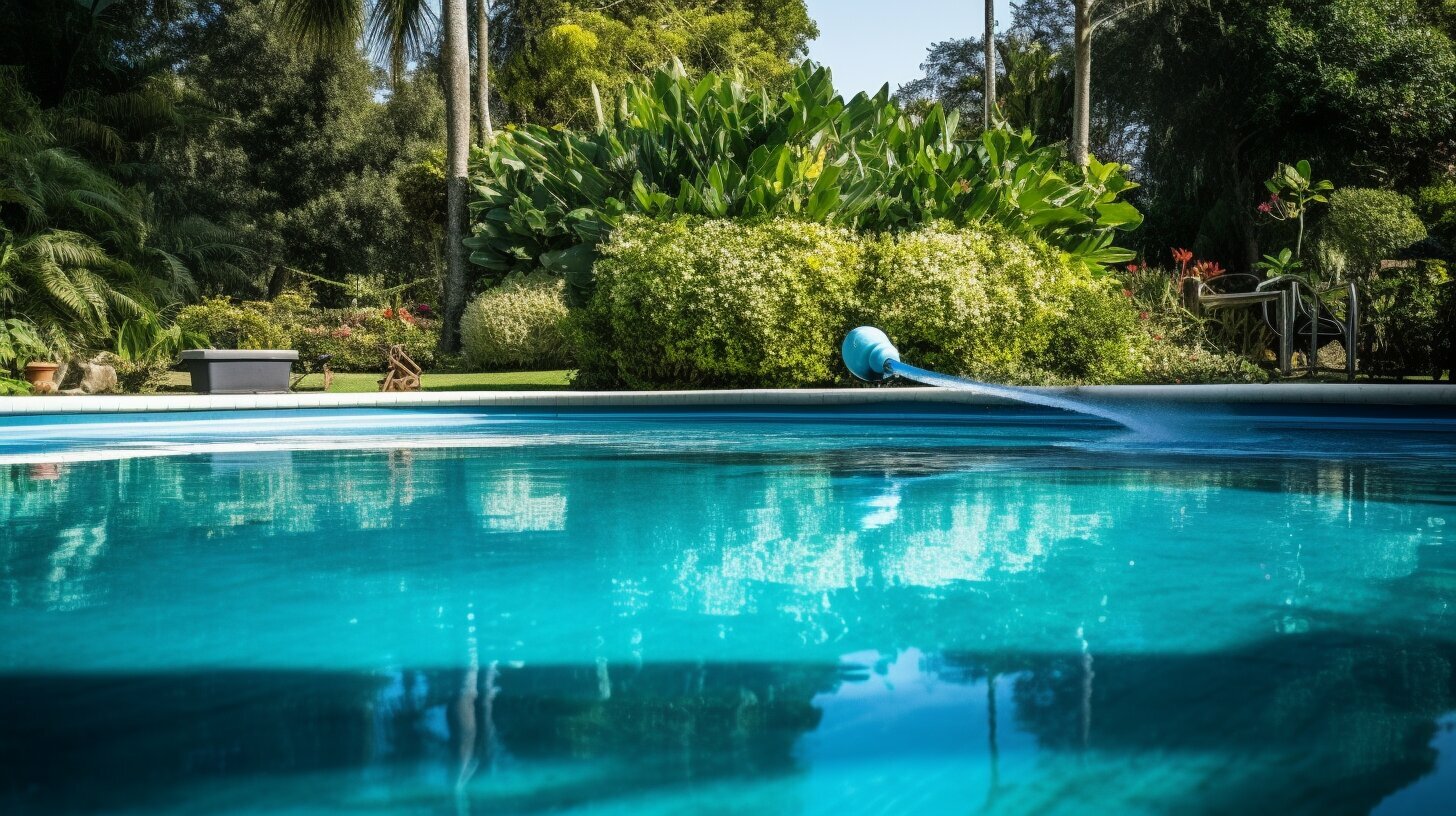
Are you looking for the best chlorine for your salt water pool? Look no further, as I am here to guide you through the various salt water pool chlorine options. Maintaining recommended chlorine levels is crucial for effective swimming pool hygiene. With the right chlorine options for salt water swimming pools, you can enjoy a crystal-clear pool all season.
In this comprehensive guide, I’ll share insights into the best chlorine tablets for salt water pools and the most effective chlorine shock treatments. Whether you’re a first-time pool owner or a seasoned pro, this guide will help you choose the best chlorine for your unique needs.
From traditional chlorine tablets to advanced pool systems, I’ll explore all the options to help you find the best chlorine for your salt water pool. Let’s dive in!
Understanding Salt Water Pools
Before exploring the best chlorine options for salt water pools, it’s essential to understand how these pools work. Unlike traditional swimming pools that rely on adding chlorine directly to the water, salt water pools use a chlorine generator or salt chlorinator to convert salt into chlorine.
This process is healthier for swimmers as it provides a gentler swimming experience with less skin and eye irritation. However, it’s important to note that regular maintenance is still necessary to ensure optimal hygiene and prevent potential issues such as algae growth.
At its most basic level, a salt water pool functions similarly to a traditional swimming pool. Water is circulated through a filtration system and sanitized with chlorine. However, the difference lies in the method of introducing chlorine to the water. In salt water pools, the generator produces chlorine from salt, which is then dispersed into the water.
This process has become increasingly popular in recent years, especially among those seeking a more environmentally friendly and cost-effective option. Additionally, salt water pools require less maintenance than their traditional counterparts, making them an attractive choice for many pool owners.
Types of Chlorine for Salt Water Pools
When it comes to maintaining chlorine levels in your salt water pool, there are different options available. Understanding the various types of chlorine and their benefits will help you choose the best option for your specific needs.
Salt Chlorinators
A popular option for salt water pool owners is the use of salt chlorinators. These systems use a salt cell to convert salt into chlorine and keep your pool sanitized. While the initial cost may be higher, salt chlorinators can be more cost-effective in the long run as they provide a continuous supply of chlorine.
Chlorine Tablets
Chlorine tablets are another convenient option for maintaining chlorine levels in your salt water pool. These tablets dissolve slowly, ensuring a steady release of chlorine over time. They are perfect for those who prefer a low-maintenance approach to pool care.
Chlorine Shock Treatments
Chlorine shock treatments are formulated to provide a high dose of chlorine, eliminating bacteria and other contaminants that regular chlorine treatments may have missed. These treatments are particularly useful after heavy pool usage or following a storm or other adverse weather conditions.
Salt Chlorination
Salt chlorination is the process by which salt is converted into chlorine. As previously mentioned, salt chlorinators utilize this method to produce chlorine for your pool. This process is gentler on the skin and eyes compared to traditional chlorine additives while still maintaining optimal pool hygiene.
Understanding the different types of chlorine for salt water pools is essential for proper pool maintenance. Whether you prefer a more hands-on approach or a low-maintenance option, there are various chlorine options to choose from.
Best Chlorine Tablets for Salt Water Pools
Chlorine tablets are an effective and popular option for maintaining adequate chlorine levels in your salt water pool. They are easy to use and provide a consistent dosage over an extended period, ensuring your pool water remains crystal clear and hygienic.
When selecting the best chlorine tablets for your salt water pool, it’s important to consider factors such as the size of your pool, the frequency of use, and any specific pool systems you have in place.
| Product | Quantity | Price | Overall Rating |
|---|---|---|---|
| Clorox Pool&Spa | 35 lbs | $129.99 | 4.5/5 |
| In The Swim | 50 lbs | $129.99 | 4/5 |
| Leisure Time | 4 lbs | $29.99 | 4/5 |
Clorox Pool&Spa and In The Swim are top-rated brands for chlorine tablets for salt water pools. They offer various quantities and sizes, catering to different pool systems and budgets. Leisure Time is an excellent budget-friendly option that still provides effective chlorine maintenance for your salt water pool.
Remember to always follow the manufacturer’s instructions for dosage, handling, and storage of chlorine tablets. Proper usage ensures optimal results and prevents any potential damage to your pool system or water quality.
Best Chlorine Shock for Salt Water Pool
Shocking your salt water pool is essential for maintaining optimal water quality. Choosing the best chlorine shock product can help eliminate bacteria, algae, and other contaminants. Here are some of the most effective shock products specifically formulated for saltwater pools:
| Product Name | Key Features |
|---|---|
| Clorox Pool&Spa Shock XtraBlue |
|
| SmartShock |
|
| In The Swim Chlorine-Free Pool Shock |
|
When applying shock treatment to your salt water pool, make sure to follow the manufacturer’s instructions carefully. Proper application will ensure effective treatment and help maintain optimal water quality.
Maintaining Chlorine Levels in Salt Water Pools
Maintaining proper chlorine levels is essential for the longevity and cleanliness of your salt water pool. While a salt chlorine generator can produce chlorine, it’s important to monitor and adjust levels as needed.
Regular chlorine maintenance involves testing chlorine levels weekly and adjusting as necessary. A common target range for chlorine levels in salt water pools is between 1-3 parts per million (ppm). If levels are too low, algae growth and bacteria buildup can occur, leading to unsanitary conditions. If levels are too high, swimmers may experience skin and eye irritation.
Using a salt chlorine generator can make maintaining chlorine levels easier, but it’s still important to regularly shock your saltwater pool. Shock treatments help break down contaminants and organic matter that can accumulate in your pool.
When shocking your salt water pool, make sure to follow the instructions on the shock product carefully. It’s also important to keep an eye on chlorine levels after shocking, as they may rise and need adjustment.
Additional Pool Care Tips
Alongside choosing the best chlorine for your salt water pool, maintaining proper pool care is crucial for ensuring optimal cleanliness and functionality. Here are some additional tips to consider:
- Regular pool maintenance: Proper pool maintenance is essential for keeping your pool clean and hygienic. This includes cleaning the pool deck, skimming the surface, and scrubbing the walls.
- Use a pool cover: A pool cover can help keep debris out of your pool and reduce evaporation, saving water and energy.
- Balance your chemicals: Properly balancing your chemicals is important for maintaining optimal pH levels and preventing bacteria growth.
- Free pool testing: Take advantage of free pool testing services offered by local pool supply stores to ensure your pool’s chemicals are properly balanced.
- Use pool salt: Pool salt can help maintain chlorine levels and reduce the need for additional chemicals.
By taking these additional pool care tips into consideration, you can ensure that your salt water pool stays in top condition and provides a safe and enjoyable swimming experience.
The Benefits of Salt Water Pools
As I’ve mentioned, salt water pools offer many advantages beyond just generating chlorine. Here are some key benefits:
- Improved Skin and Hair Health: Salt water pools have a lower chlorine concentration, resulting in less skin and hair damage. Swimmers with sensitive skin often prefer salt water pools for this reason.
- Reduced Chemical Exposure: With the use of salt chlorinators, salt water pools require fewer chemicals than traditional chlorine pools. This reduces the risk of chemical-related injuries or illnesses.
- Lower Maintenance Costs: Salt water pool systems have lower maintenance costs in the long run than traditional pools. The initial installation cost may be higher, but the savings on chemicals and maintenance make up for it over time.
Overall, salt water pools are a great choice for anyone looking for a luxurious swimming experience with reduced maintenance and chemical-related risks. Investing in a salt chlorine generator for your pool system can provide you with these benefits and more.
Types of Pool Shock Treatments
When it comes to maintaining the cleanliness and clarity of your salt water pool, shock treatments play an important role. Shock treatments eliminate bacteria and algae growth, keeping the water safe and healthy for swimming.
There are different types of pool shock treatments available, each with unique benefits and purposes. Here are some of the most common types of pool shock treatments:
Calcium Hypochlorite Shock
Calcium hypochlorite shock is a powdered, quick-dissolving form of chlorine shock. This type of shock treatment is ideal for eliminating algae growth and bacteria, making it an excellent choice for regular pool maintenance. It’s important to note that calcium hypochlorite shock has a high pH level, so it’s not recommended for routine use.
Lithium Hypochlorite Shock
Lithium hypochlorite shock is a quick-dissolving shock treatment that works well for removing mild algae growth and bacteria. Unlike calcium hypochlorite shock, it has a neutral pH level that won’t interfere with regular chlorine levels. Lithium hypochlorite shock is also a good choice for weekly pool maintenance.
Dichlor Shock
Dichlor shock is a granular form of chlorine shock treatment that dissolves slowly and is gentle on pool surfaces. It’s a good choice for removing bacteria and algae, and it’s also effective at removing chlorine stains. However, dichlor shock is acidic, so it’s important to monitor pH levels after using it.
Non-Chlorine Shock
Non-chlorine shock is an alternative to traditional chlorine-based shock treatments. It typically contains potassium monopersulfate and is gentler on skin and eyes. This type of shock treatment is best used for regular pool maintenance, as it won’t eliminate algae growth or bacteria to the same extent as chlorine-based shocks.
Ultimately, the type of pool shock treatment you choose will depend on your specific pool maintenance needs and preferences. It’s important to follow the manufacturer’s instructions carefully and monitor pH levels after using any pool shock treatment. This will ensure that your salt water pool remains clean, clear, and safe for swimming.
Conclusion
Choosing the best chlorine for your salt water pool is an essential aspect of pool maintenance. As I’ve discussed in this guide, there are various options available, including chlorine tablets and shock treatments. It’s important to understand how salt water pools work, the different types of chlorine available, and how to maintain proper chlorine levels. Additionally, implementing additional pool care tips such as preventing common issues and using pool salt can help keep your pool in top condition.
Remember to prioritize pool care and maintenance to ensure your salt water pool stays clean and efficient. A well-maintained pool provides a safe and enjoyable swimming experience for you and your family. At poolclinics.com, you can find more information and resources on pool care to ensure your pool stays in optimal condition.
FAQ
What are the different types of chlorine for salt water pools?
The different types of chlorine for salt water pools include salt chlorinators, chlorine tablets, and specific shock treatments formulated for salt water pools.
What are the best chlorine tablets for salt water pools?
The best chlorine tablets for salt water pools depend on your specific needs. Floating dispensers and advanced pool systems are popular options that effectively maintain chlorine levels.
What is the best chlorine shock for salt water pools?
The best chlorine shock products for salt water pools are designed to kill bacteria, eliminate algae, and enhance the effectiveness of regular chlorine treatments.
How do I maintain chlorine levels in my salt water pool?
Maintaining chlorine levels in a salt water pool requires regular maintenance, using a salt chlorine generator, and effectively shocking the pool when needed.
What additional tips can I follow for pool care?
In addition to choosing the right chlorine for your salt water pool, expert tips for pool maintenance, preventing common issues, and the benefits of pool salt can help keep your pool in top condition.
What are the benefits of salt water pools?
Salt water pools offer benefits such as improved skin and hair health, reduced chemical exposure, and lower maintenance costs compared to traditional chlorine pools.
What are the different types of pool shock treatments?
In addition to specific chlorine shock products for salt water pools, there are different types of pool shock treatments available, each serving a specific purpose. Understanding these options can help you choose the right treatment for your salt water pool.
Quick Navigation







